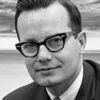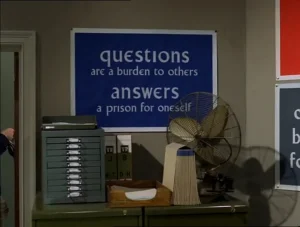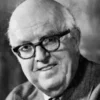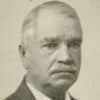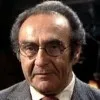When I see flags sprouting on official lapels, I think of the time in China when I saw Mao’s Little Red Book on every official’s desk, omnipresent and unread.
Bill Moyers (b. 1934) American journalist and public commentator
Essay (2003-02-28), “Patriotism and the Flag,” NOW with Bill Moyers (PBS)
(Source)
Moyers quoted the comments a few years later in a speech to the National Conference for Media Reform (St Louis) (2005-05-15); the phrase is often cited to that occasion.
Quotations about:
compliance
Note not all quotations have been tagged, so Search may find additional quotes on this topic.
Questions are a burden to others
Answers a prison for oneselfGeorge Markstein (1926-1987) British journalist, author, screenwriter
The Prisoner, 01×01 “Arrival” (1967-09-29) [with David Tomblin]
(Source)
Sign in the Labour Exchange office of the Village.
You may force men, by interest or punishment, to say or swear they believe, and to act as if they believed; you can go no farther.
When you think of the long and gloomy history of man, you will find that far more, and far more hideous, crimes have been committed in the name of obedience than have ever been committed in the name of rebellion.
C. P. Snow (1905-1980) English novelist, physical chemist, bureaucrat [Charles Percy Snow]
“The Moral Un-Neutrality of Science,” speech, American Association for the Advancement of Science, New York City (27 Dec 1960)
(Source)
Reprinted in Science (27 Jan 1961) and then in Public Affairs (1971).
It is necessary to distinguish between the virtue and the vice of obedience.
Lemuel K. Washburn (1846-1927) American freethinker, writer
Is the Bible Worth Reading and Other Essays, Epigram (1911)
(Source)
By force you can make hypocrites — men who will agree with you from the teeth out, and in their hearts hate you. We want no more hypocrites. We have enough in every community. And how are you going to keep from having more? By having the air free, — by wiping from your statute books such miserable and infamous laws as this.
Robert Green Ingersoll (1833-1899) American lawyer, agnostic, orator
Speech to the Jury, Trial of C. B. Reynolds for Blasphemy, Morristown, New Jersey (May 1887)
(Source)
The dividing line between those who want to think and therefore have to judge by themselves, and those who do not, strikes across all social and cultural or educational differences. In this respect, the total moral collapse of respectable society during the Hitler regime may teach us that under such circumstances those who cherish values and hold fast to moral norms and standards are not reliable: we now know that moral norms and standards can be changed overnight, and that all that then will be left is the mere habit of holding fast to something. Much more reliable will be the doubters and skeptics, not because skepticism is good or doubting wholesome, but because they are used to examine things and to make up their own minds. Best of all will be those who know only one thing for certain: that whatever else happens, as long as we live we shall have to live together with ourselves.
Hannah Arendt (1906-1975) German-American philosopher, political theorist
“Personal Responsibility Under Dictatorship” (1964)
(Source)
For the lesson of such stories is simple and within everybody’s grasp. Politically speaking, it is that under conditions of terror, most people will comply but some people will not, just as the lesson of the countries to which the Final Solution was proposed is that “it could happen” in most places but it did not happen everywhere. Humanly speaking, no more is required, and no more can reasonably be asked, for this planet to remain a place fit for human habitation.
Hannah Arendt (1906-1975) German-American philosopher, political theorist
Eichmann in Jerusalem: A Report on the Banality of Evil, ch. 14 (1963)
(Source)
Speaking of resistance to Nazi atrocities.
Dissent is the native activity of the scientist, and it has got him into a good deal of trouble in the last years. But if that is cut off, what is left will not be a scientist. And I doubt whether it will be a man.
Jacob Bronowski (1908-1974) Polish-English humanist and mathematician
Lecture, MIT (19 Mar 1953)
(Source)
Reprinted as Science and Human Values, Part 3, sec. 5 "The Sense of Human Dignity" (1961).
To work a Man to thy Bent: 1. Know his Inclinations. 2. Observe his Ends. 3. Search out his Weakness. And so thou mayst either draw or drive him.
Thomas Fuller (1654-1734) English physician, preacher, aphorist, writer
Introductio ad Prudentiam, Vol. 1, # 1067 (1725)
(Source)
Conscience: the inner voice which warns us that someone may be looking.
H. L. Mencken (1880-1956) American writer and journalist [Henry Lewis Mencken]
A Little Book in C Major, ch. 4, § 12 (1916)
(Source)
Variants:CONSCIENCE. The inner voice which warns us that someone is looking.
[A Book of Burlesques, "The Jazz Webster" (1924)]Conscience is the inner voice which warns us that someone may be looking.
[Chrestomathy, ch. 30 "Sententiae" (1949)]
The basic test of freedom is perhaps less in what we are free to do than in what we are free not to do.
Eric Hoffer (1902-1983) American writer, philosopher, longshoreman
The Passionate State of Mind, Aphorism 176 (1955)
(Source)
COLE: We were supposed to draw a picture. Anything we wanted. I drew a man. He got hurt in the neck by another man with a screwdriver.
MALCOLM: You saw that on TV, Cole?
COLE: Everyone got upset. They had a meeting. Mom started crying. I don’t draw like that anymore.
MALCOLM: How do you draw now?
COLE: I draw — people smiling, dogs running, rainbows. They don’t have meetings about rainbows.
M. Night Shyamalan (b. 1970) Indian-American screenwriter, director
The Sixth Sense (1999)
(Source)
(Source (Video); dialog confirmed)

